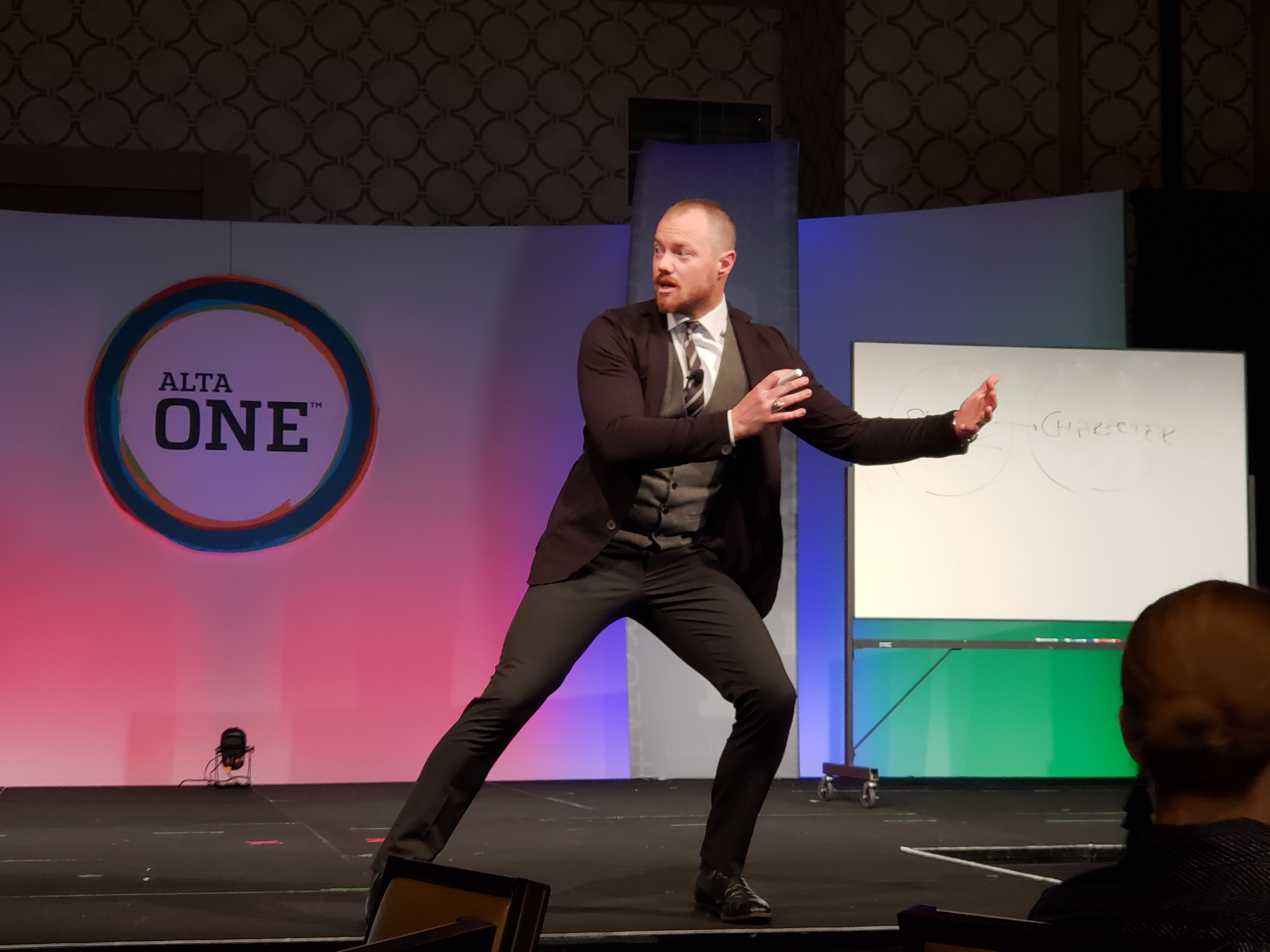The Meaning Maker: Challenge Yourself to Make a Purposeful Impact
October 30, 2018

A catalyst for transformation, Phill Nosworthy provided insight to ALTA ONE attendees on how to make work and life meaningful in times of massive change. The executive advisor, futurist, speaker and author shared thoughts on personal mastery and the future of work.
He said because people are bombarded with constant options, it makes people doubt they’re doing things right and are in constant comparison mode. People are left searching for an anchor.
“We are in an era where we are experiencing a decline in traditional value centers,” Nosworthy said. “We know that fewer people are going to church and scrutinizing leadership more than ever. Independent thinking is challenging what’s been held as the right way to do things. This is an era in which digital and biological systems are interwoven.”
Nosworthy cited an Accenture study that found 70 percent of recent graduates want to work in a positive environment and where what they do makes a difference. The studay found that 73 percent of this group said finding a job they loved was more important than one that pay well.
However, Nosworthy said “meaning is massively missing” because 55 percent of workers in the U.S. say their job doesn’t matter to them or anybody else.
“As leaders, we have to learn how to become meaning makers,” Nosworthy said to ALTA ONE attendees.
He offered the following tips to manufacture meaning in your operation:
- Mastery: Leaders must tap into the urge to improve, encouraging mastery that will set into motion a positive group of emotional states including pride, satisfaction and ambition. “I’ve found that cultivating a growth mindset, and tracking even small gains in performance leads to radical improvements in confidence, productivity and a growing sense of autonomy within a team,” Nosworthy said. “As a leader, go out of your way to give growth focused feedback and celebrate effort even more than you celebrate achievement. In this way you will be doubling down on one of the most vital pillars of meaning at work—mastery.
- Autonomy: People become internally driven when they feel in charge of their own work and fate. Nosworthy said this is why ideas such as intrapreneurship and job crafting are becoming popular. He quoted psychologist Dan Pink who said, “whilst control might lead to compliance, it’s autonomy that leads to engagement.” “The trick here is to match the level of autonomy you are prepared to give with the level of experience your team member has along with the level of responsibility they are prepared to own,” Nosworthy said.
- Purpose: Employees need to know that there is a point to what they are doing. To help your team find purpose in what they do, Nosworthy said to ask, “Beyond making money, why do we do what we do?” No matter the answer, “it should be something that is compelling enough to get people through the inevitable hard days, and focus their effort every other day,” he added.
- Connection: The National Bureau of Economic Research studied 5,000 participants The group concluded that doubling your group of friends has the same effect on your wellbeing as increasing your income by 50 percent. Nosworthy said we are hardwired for connection. Finding connections within your team deepens the sense of meaning in the workplace. workplace. “It is no coincidence that whether or not you have a best friend at work is one of Gallop’s key indicators of employee engagement and team productivity,” Nosworthy said. “As an organization you must constantly ask, “What are we doing to foster connection?”
- Contribution: Teams need to be able to see the benefit their work has on others. Nosworthy said this fundamental lies at the heart of the meaning maker quest. Contribution focused activities like corporate volunteering, matched giving and philanthropic investing are rising in prominence because organizations know that it matters to the way that people think about their work. “Writing a smart giving strategy into the DNA of your team is one of surest ways to make sure people love showing up to where they work each day,” Nosworthy added.
- Challenges: This is about growing, learning and overcoming obstacles. According to Nosworthy, the best performers embrace fear and step out of their comfort zones, because putting themselves under the right kind of stress can trigger huge results. “The best challenges are far enough ahead to cause your employees to stretch but close enough within reach. Leaders must get that calibration spot on,” Nosworthy said.
In closing, Nosworthy shared a story about the alchemist’s creed. Alchemists were people who took things of little value and created gold out of them.
“Everyone thought the process was the power. It wasn’t. it was the person,” Nosworthy said. “Alchemsist knew it was the person who put the process into practice. The real craft was being the person who was blessed doing a simple process. This is why meaning makers can’t give direction for people to places they’ve never been.”
One of the most fundamental gaps in business today is skill and character. According to Nosworthy, there are plenty of skilled people with no character.
“Your skill can take you to places that your character can’t sustain you,” he said. “The size of the gap between skill and character is the size of disfunction in your life. The challenge as a meaning maker is to close that gap. You can do that through knowledge and application.”
Contact ALTA at 202-296-3671 or [email protected].